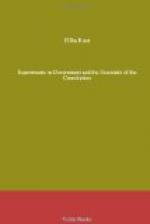There is now a limited use of the Referendum upon certain comparatively simple questions. No one has ever successfully controverted the view expressed by Burke in his letter to the electors of Bristol, that his constituents were entitled not merely to his vote but to his judgment, even though they might not agree with it. But there are some questions upon which the determining fact must be the preference of the people of the country or of a community; such as the question where a capital city or a county seat shall be located; the question whether a debt shall be incurred that will be a lien on their property for a specific purpose; the question whether the sale of intoxicating liquors shall he permitted. Upon certain great simple questions which are susceptible of a yes or no answer it is appropriate that the people should be called upon to express their wish by a vote just as they express their choice of the persons who shall exercise the powers of government by a vote. This, however, is very different from undertaking to have the ordinary powers of legislation exercised at the ballot box.
In this field the weakness, both of the Initiative and of the Compulsory Referendum, is that they are based upon a radical error as to what constitutes the true difficulty of wise legislation. The difficulty is not to determine what ought to be accomplished but to determine how to accomplish it. The affairs with which statutes have to deal as a rule involve the working of a great number and variety of motives incident to human nature, and the working of those motives depends upon complicated and often obscure facts of production, trade, social life, with which men generally are not familiar and which require study and investigation to understand. Thrusting a rigid prohibition or command into the operation of these forces is apt to produce quite unexpected and unintended results. Moreover, we already have a great body of laws, both statutory and customary, and a great body of judicial decisions as to the meaning and effect of existing laws. The result of adding a new law to this existing body of laws is that we get, not the simple consequence which the words, taken by themselves, would seem to require, but a resultant of forces from the new law taken in connection with all existing laws. A very large part of the litigation, injustice, dissatisfaction, and contempt for law which we deplore, results from ignorant and inconsiderate legislation with perfectly good intentions. The only safeguard against such evils and the only method by which intelligent legislation can be reached is the method of full discussion, comparison of views, modification and amendment of proposed legislation in the light of discussion and the contribution and conflict of many minds. This process can be had only through the procedure of representative legislative bodies. Representative government is something more than a device to enable the people to have their




